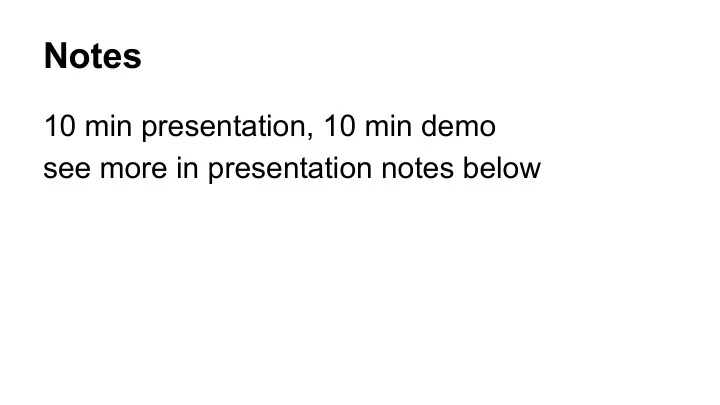

Notes 10 min presentation, 10 min demo see more in presentation notes below
Real-Time Interactive Music In Haskell Paul Hudak, Donya Quick, Mark Santolucito, Daniel Winograd-Cort
Functional Reactive Programming - Used for time-varying systems - Abstraction of time fits music well - Simple and concise code - Works well in a classroom setting - Rapid prototyping
Euterpea - Arrowized-FRP EDSL for computer music - Written in Haskell - Provides: - Realtime MIDI production - Built-in MIDI I/O - Waveform manipulation and synthesis
Real-time Interactive Music - Tidal, live coding in ghci - Supercollider, imperative commands - Csound, written in C - We would like this for FRP (in Haskell)
Real-time Interactive Music - Euterpea has poor support for this. - Naively connecting a GUI can lead to: - High audio latency - Unpredictable performance - Also, ad-hoc inter-library connections are: - Not extensible - Difficult to maintain
Media Modules - Different media types on different threads - No data rate bottlenecks, even with varying rates - Easy interlibrary communication - Abstraction agnostic Media Modules: Intermedia Systems in a Pure Functional Paradigm , ICMC 2015, Mark Santolucito, Donya Quick, and Paul Hudak
Media Modules - We made an attempt at a universal FRP API:
Media Modules - We made an attempt at a universal FRP API: - A generic Arrow type that supports IO class Arrow a => ArrowIO a where liftAIO :: (b -> IO c) -> a b c type IOAuto = Automaton (Kleisli IO)
Media Modules - We made an attempt at a universal FRP API: - A generic Arrow type that supports IO - Asynchronous inter-library operators asyncCIO :: (ArrowIO a, NFData c) => (IO d, d -> IO ()) -> (d -> IOAuto b c) -> a b [c]
Media Modules - We made an attempt at a universal FRP API: - A generic Arrow type that supports IO - Asynchronous inter-operative operators - We built these concepts into the FRP GUI library UISF.
Connecting UISF and Euterpea - Euterpea builds a UISF widget for midiOut: midiOut :: ArrowIO a => a (OutputDeviceID, [MidiMessage]) () midiOut = liftAIO action where action (dev, mm) = do outputMidi dev forM_ mm (\m -> deliverMidi dev (0, m))
Connecting UISF and Euterpea - Now we lift that asynchronously to UISF: asyncMidi :: NFData c => PureAuto b ((OutputDeviceID, [MidiMessage]), Int, c) -> UISF b [c] asyncMidi sf = asyncCIO (return (), const $ return ()) sf where sf = proc b -> do (mdata, t, c) <- liftAutoIO sf -< b midiOut -< mdata liftAIO threadDelay -< t returnA -< c
Demo: UISF + Euterpea - Media module design allows seamless operation. - The system overcomes performance issues. - Underlying design remains pure and simple. - Our demo stress tests the ideas. - Multi-part UI - Hard music from Kullita Grammar-based automated music composition in Haskell , FARM 2013, Donya Quick and Paul Hudak
Demo: Elerea + Euterpea - We took a similar approach with Elerea. - It’s currently less polished, - But we get good performance and clean code.
Future Work - Formalize the media module API. - How can we make different media libraries inter- operate easily and efficiently? - Retrofit more libraries into media modules. - Extend the inter-operability to other media systems. - Talk to us about how we can incorporate your system!
Conclusions - Euterpea and UISF work together easily. - They retain a relatively pure, functional style. - A great tool for teaching functional computer music. - We encourage users to play with the system: - euterpea.com - haskell.cs.yale.edu - cabal install euterpea - cabal install uisf
Recommend
More recommend